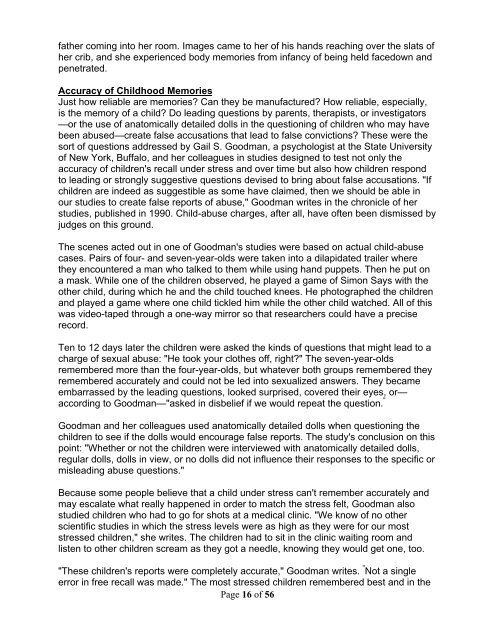Do you want to know what incest is? What it really is? No ...
Do you want to know what incest is? What it really is? No ...
Do you want to know what incest is? What it really is? No ...
Create successful ePaper yourself
Turn your PDF publications into a flip-book with our unique Google optimized e-Paper software.
father coming in<strong>to</strong> her room. Images came <strong>to</strong> her of h<strong>is</strong> hands reaching over the slats of<br />
her crib, and she experienced body memories from infancy of being held facedown and<br />
penetrated.<br />
Accuracy of Childhood Memories<br />
Just how reliable are memories? Can they be manufactured? How reliable, especially,<br />
<strong>is</strong> the memory of a child? <strong>Do</strong> leading questions by parents, therap<strong>is</strong>ts, or investiga<strong>to</strong>rs<br />
—or the use of ana<strong>to</strong>mically detailed dolls in the questioning of children who may have<br />
been abused—create false accusations that lead <strong>to</strong> false convictions? These were the<br />
sort of questions addressed by Gail S. Goodman, a psycholog<strong>is</strong>t at the State Univers<strong>it</strong>y<br />
of New York, Buffalo, and her colleagues in studies designed <strong>to</strong> test not only the<br />
accuracy of children's recall under stress and over time but also how children respond<br />
<strong>to</strong> leading or strongly suggestive questions dev<strong>is</strong>ed <strong>to</strong> bring about false accusations. "If<br />
children are indeed as suggestible as some have claimed, then we should be able in<br />
our studies <strong>to</strong> create false reports of abuse," Goodman wr<strong>it</strong>es in the chronicle of her<br />
studies, publ<strong>is</strong>hed in 1990. Child-abuse charges, after all, have often been d<strong>is</strong>m<strong>is</strong>sed by<br />
judges on th<strong>is</strong> ground.<br />
The scenes acted out in one of Goodman's studies were based on actual child-abuse<br />
cases. Pairs of four- and seven-year-olds were taken in<strong>to</strong> a dilapidated trailer where<br />
they encountered a man who talked <strong>to</strong> them while using hand puppets. Then he put on<br />
a mask. While one of the children observed, he played a game of Simon Says w<strong>it</strong>h the<br />
other child, during which he and the child <strong>to</strong>uched knees. He pho<strong>to</strong>graphed the children<br />
and played a game where one child tickled him while the other child watched. All of th<strong>is</strong><br />
was video-taped through a one-way mirror so that researchers could have a prec<strong>is</strong>e<br />
record.<br />
Ten <strong>to</strong> 12 days later the children were asked the kinds of questions that might lead <strong>to</strong> a<br />
charge of sexual abuse: "He <strong>to</strong>ok <strong>you</strong>r clothes off, right?" The seven-year-olds<br />
remembered more than the four-year-olds, but <strong>what</strong>ever both groups remembered they<br />
remembered accurately and could not be led in<strong>to</strong> sexualized answers. They became<br />
embarrassed by the leading questions, looked surpr<strong>is</strong>ed, covered their eyes, or—<br />
according <strong>to</strong> Goodman—"asked in d<strong>is</strong>belief if we would repeat the question. "<br />
Goodman and her colleagues used ana<strong>to</strong>mically detailed dolls when questioning the<br />
children <strong>to</strong> see if the dolls would encourage false reports. The study's conclusion on th<strong>is</strong><br />
point: "Whether or not the children were interviewed w<strong>it</strong>h ana<strong>to</strong>mically detailed dolls,<br />
regular dolls, dolls in view, or no dolls did not influence their responses <strong>to</strong> the specific or<br />
m<strong>is</strong>leading abuse questions."<br />
Because some people believe that a child under stress can't remember accurately and<br />
may escalate <strong>what</strong> <strong>really</strong> happened in order <strong>to</strong> match the stress felt, Goodman also<br />
studied children who had <strong>to</strong> go for shots at a medical clinic. "We <strong>know</strong> of no other<br />
scientific studies in which the stress levels were as high as they were for our most<br />
stressed children," she wr<strong>it</strong>es. The children had <strong>to</strong> s<strong>it</strong> in the clinic wa<strong>it</strong>ing room and<br />
l<strong>is</strong>ten <strong>to</strong> other children scream as they got a needle, <strong>know</strong>ing they would get one, <strong>to</strong>o.<br />
"These children's reports were completely accurate," Goodman wr<strong>it</strong>es.<br />
Page 16 of 56<br />
" <strong>No</strong>t a single<br />
error in free recall was made." The most stressed children remembered best and in the


